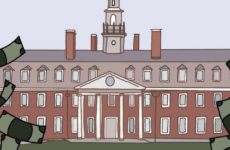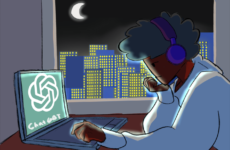Every Thursday night, Young Republicans gather at the same time — and on the other side of campus — as Young Democrats. While a typical Young Democrats’ meeting is characterized by a circle of armchairs and formally moderated debate in the Bay Room of St. John Hall, a Young Republicans’ meeting is a more laid-back gathering of students who discuss any topics that come to mind. Participants represents a range of opinions: staunch conservatives, those that support only certain Republican policies, and those who come out of curiosity. Not long ago, I was one of the curious minds, and was welcomed with no questions asked.
The Young Republicans are a minority on the Choate campus — a large portion of the student body, hailing from places like New York and California, identifies as liberal. Choate itself sits in a blue state, though it enjoys the privilege of a diverse student body that comes from all around the world, including countries without a two-party system or a particularly democratic form of government. Coming from a self-proclaimed Socialist Republic and one-party state, I went from a nearly completely homogenous community in Vietnam to an immensely diverse one, where students not only differ by race but also socioeconomic background, religion, and other identities. While the School rightfully celebrates this diversity and frequently engages its students in conversation about these differences, political identity always seems to get overlooked. If we can have uncomfortable conversations about topics like consent and race, I wonder, can we not also have such conversations about political identity?
As an international student with mostly liberal friends, I don’t find myself able answer this question on my own. Hoping to hear more viewpoints from the conservative minority, I sent an anonymous survey to the Young Republicans. From the club’s 20 active members, I received 14 responses that quickly confirmed what I had suspected: the Young Republicans felt that they were too quickly judged for their perspectives.
Members of the Young Republicans come from both red and blue states. Some have religious backgrounds while others don’t. Yet all stated that their opinions “aren’t being heard” or “are being heard but not respected.” The survey also revealed a general frustration with the fact that they usually found themselves alone against a majority of opposing opinions. Some responded that they felt their opinions were often and labeled “hate speech” or “misogynistic” or “racist” without proper deliberation. Because of this, right-leaning students look for platforms through which they can share their views without being shut down or ridiculed. A hundred percent of responses confirmed the tight-knit community of Young Republicans as such a place. People come to those meetings to express viewpoints that they feel they can’t share anywhere else on campus, and to receive unconditional support for their courage in sharing.
The political tension on Choate campus has magnified since the inauguration of President Trump in 2016. It has been a while since we as a school has had constructive conversations and peaceful joint meetings about American politics. President Trump has become the face of the Republican Party, and his views on women and immigrants have hurt the reputation of conservatism as a whole. This prevents students from having unbiased conversations with campus conservatives.
At the recent joint meeting between the Young Democrats, Young Republicans, Spectrum, and CDSA, moderators struggled to control the conversation. The cramped room and limited time frame stunted proper discourse. Some students were interrupted while they were talking, and the respectful silence often erupted into loud disagreement. Nearly everyone left dissatisfied, seemingly clinging even more tightly to their existing beliefs. In that overwhelming environment, both sides were at fault for picking at small details while failing to understand overarching points. Everyone felt as if he or she were in a fight to defend a side. The truth is, everyone just wanted to be understood.
Human beings seem naturally to react defensively to opposing opinions. We must acknowledge this inherent psychological conflict and pause to offer our peers the space to voice their perspectives. There’s no guarantee that we will agree on anything, but we can always understand and respect one another.

Alex Amine ’19, president of the Young Republicans, leads his club’s weekly meeting in the Lanphier Commons.




